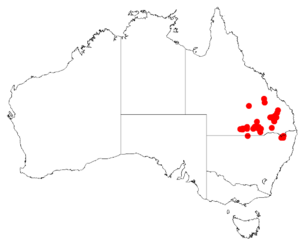Burbidge's wattle facts for kids
Quick facts for kids Burbidge's wattle |
|
|---|---|
| Scientific classification |
|
| Kingdom: | Plantae |
| Clade: | Tracheophytes |
| Clade: | Angiosperms |
| Clade: | Eudicots |
| Clade: | Rosids |
| Order: | Fabales |
| Family: | Fabaceae |
| Clade: | Mimosoideae |
| Genus: | Acacia |
| Species: |
A. burbidgeae
|
| Binomial name | |
| Acacia burbidgeae Pedley
|
|
 |
|
| Occurrence data from AVH | |
| Script error: The function "autoWithCaption" does not exist. | |
Script error: No such module "Check for conflicting parameters".
The Burbidge's wattle (Acacia burbidgeae) is a special kind of shrub or small tree. It belongs to a big group of plants called Acacia, also known as wattles. This plant is endemic, which means it only grows naturally in certain parts of New South Wales and Queensland in Australia. It is also known as Burbidge's wattle.
What it Looks Like
This wattle can grow either straight up or spread out. It usually reaches about 2 metres (7 ft) (about 6.5 feet) tall. Some plants can even grow as high as 4 m (13 ft) (about 13 feet)! Its small branches have a few hairs and are a bit sticky.
The leaves of this plant are not typical leaves. They are called phyllodes. These are like flattened leaf stalks that do the job of leaves. They are thin and usually curve slightly. They are about 15 to 40 mm (0.59 to 1.57 in) (0.6 to 1.6 inches) long and very narrow, only about 0.6 to 1 mm (0.024 to 0.039 in) (0.02 to 0.04 inches) wide.
The Burbidge's wattle blooms from June to October. It produces bright yellow flowers. These flowers grow in round, ball-shaped clusters. Each cluster has about 20 to 30 golden flowers. After the flowers, long, flat, brown seed pods form. These pods can be up to 6.5 cm (2.6 in) (2.5 inches) long and about 3 mm (0.12 in) (0.1 inches) wide.
How it Got its Name
The Burbidge's wattle was first officially described in 1979. A botanist named Leslie Pedley gave it its scientific name. He wrote about it in a science journal called Austrobaileya.
The name burbidgeae honors a famous Australian botanist. Her name was Nancy Tyson Burbidge. She was a very important plant scientist.
This wattle is part of a group of similar Acacia plants. It is most closely related to Acacia johnsonii, Acacia pilligaensis, and Acacia islana.
Where it Grows
You can find Burbidge's wattle in the northeastern parts of New South Wales. It grows near towns like Emmaville and south of Torrington.
It also grows in the southeastern parts of Queensland. It likes to live in dry sclerophyll forests. These are forests with tough, hard-leaved plants. It prefers sandy soils that come from granite rocks. In Queensland, its range stretches from Cunnamulla in the west to St George in the east. It also grows north to Chinchilla.
 | Laphonza Butler |
 | Daisy Bates |
 | Elizabeth Piper Ensley |

